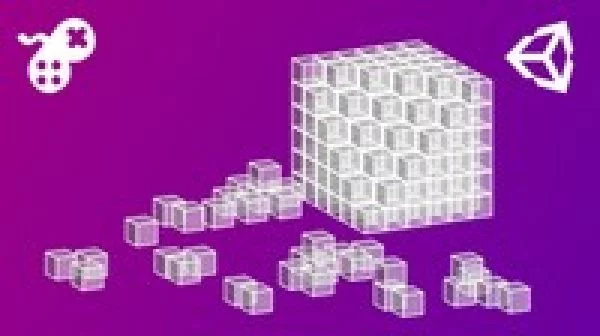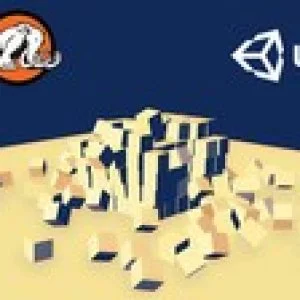
Did you know that there is not one single cube used in Minecraft? Have you ever looked at Minecraft and wondered, How did they build it? – a great thing to ponder, it is. If you haven’t and think that programming a whole bunch of cubes is child’s play, then think again. On the surface Minecraft looks as though it would be a simple world to recreate in Unity. Start placing cubes around a scene and see how far you get before the frame–rate grinds to a mind–numbing halt. So wonder and fret no longer, as this course reveals the secrets of programming and rendering procedurally–generated voxel worlds, like Minecraft, with C# in Unity.
In this course, Penny teaches all the invaluable skills you will require to build a blocky world from scratch using her internationally acclaimed teaching style and knowledge from over 25 years working with games and graphics. But hold on tight as you’ll be taken on a journey across the computer graphics realm as it is taught to post–graduate university students. Through detailed descriptions and hands–on workshops examining all you need to know about 3d data structures, building meshes from scratch, using noise algorithms to generate terrain features and caves, and texturing blocks you will be programming your own world in no time.
Instructor Details
Courses : 16
Specification: How to Program Voxel Worlds Like Minecraft with C# in Unity
|
21 reviews for How to Program Voxel Worlds Like Minecraft with C# in Unity
Add a review Cancel reply
This site uses Akismet to reduce spam. Learn how your comment data is processed.

| Price | $12.99 |
|---|---|
| Provider | |
| Duration | 6.5 hours |
| Year | 2020 |
| Level | Intermediate |
| Language | English |
| Certificate | Yes |
| Quizzes | Yes |

$19.99 $12.99






Mark Botta –
This is a great introduction to building Minecraft like worlds. Concepts are introduced in short, easy to digest videos that start with straightforward implementations. When limitations of the implementations are reached, new concepts are introduced and the implementation is refactored to adapt. Ultimately the lessons build on each other to create an infinite, dynamic and persistent world. The code and resources provided allow concentrating on the lessons to learn, instead of on code details. And although the resources in later lessons get a bit out of sync with the lessons, it’s only a minor issue and quickly resolved as the lessons progress. There are also some minor bugs, but finding and fixing them is a good exercise. The result is a great platform to experiment with procedural generation, and adding new gameplay features. Definitely recommended.
Jimmy Asher –
This is an excellent course just the right speed and depth. Easy to follow code and explanations.
Matthew Butt –
As Usual, Penny explains everything very well. She could go deeper into most topics I am sure but her approach leaves you with enough understanding to proceed comfortably. I am experienced with Unity but really wish I had these back when I started. I love the refreshers!
Sander Liivandi –
At first I was a little startled by the pace, as I was expecting a bit slower start, but eventually it turned out to be quite befitting. I really enjoyed the challenges.
Paul Nicowski –
I have been trying to start with a voxel based environment with XNA (FNA reimplementation) for a game I was working on. This was a good way to introduce myself to approaches to solving the various issues in voxel based environments. The video at the end included some good insight for me, and some positive reinforcement to some things I was already thinking about. Overall, I am satisfied with the course. It was very information dense, and I had to rewatch some parts of the videos several times to understand exactly what was being explained. I feel like I understand how to do this significantly better, from before, I was not as clear as to how to approach these problems when I was working with XNA. (I think I would have experienced the same issues if I tried doing it with Unity as well, without information like in this course!) I want to try to see if I can reimplement this into XNA because I have suspected that XNA has a bit more freedom: from doing general research it seems like Unity can be more locked down. But, I will still consider using Unity for making games. Thanks so much for making this course. Extremely informative.
Jair Mendoza Matias –
El curso est excelente y de verdad mejoro mi visi n en varios aspectos de Unity
Michael D Fenlon –
Lots of information, but some lines of code are not explained as much as they could be
Chelsey R Smith –
Another great course by Penny. While the theme of the course was voxel Minecraft worlds, I feel it was more of a deep dive into the optimization of a game world and seeing how things work at a lower level. I came looking for a solution for something I have been scratching my head on for a while and this course provided just that. Keep up the good work and thanks, Chelsey Smith
Dmitry Belyaev –
Penny did a tremendous effort of breaking down the solid of Minecraft game concept into small digestible cubes. I did not expect at the beginning that I would be able to write and actually UNDERSTAND the code to recreate a voxel environment of my own!!!
Kenneth Cone –
This is incredible. Very well explained, just enough detail and not too much. I could build a whole game based on what I’ve seen so far. Perfect. 🙂
Chris Thackrey –
Great Course!
Mh –
Exceptionally difficult subject but Penny’s knowledge on each subject in each video shines through. Fun series. Would love an update as I feel this series deserves it!
Tom Logan –
Very good course. I’m learning a lot about voxel worlds. The instructor is very knowledgeable on this subject.
Benjamin Elsdon –
This course was really fun to do but I wish it expanded a bit more on Biomes and optimisations but other than that it was amazing!
Nathaniel Morkan –
The instructor is very informative and clear about how the concepts work, along with how to use them.
Marian Pek r –
Another awesome course by Penny de Byl. It’s a real gem and I’d recommend it not only to those who are interested in building voxel worlds but also to those who are interested in optimization and clever algorithms, which as you can see in this course, goes hand in hand.
Alexey Vyakhorev –
Build minecraft within two weekends. Thank you, Penny de Byl. Got a lot of insights and spent time efficiently. Drawbacks?.. Well, there are batching and threading things to optimise. A nice challenge after the course. )
Neil McKenna –
Even in 2021 this is still great to understand how Minecraft / voxels work , Just great
Felipe Vega –
So good awesome!
Hadidi Mohammed –
FANTASTIC !!!!!!!!!!
Jeffrey D Engelstad –
This course has a lot of good information in it. But most of it is gone over very fast and the code is not explained very well of why it is being done this way but more of just here it is. Also no real places to put it to use. Trying to code along with the lessons will have you rewinding and watching over and over again. Just to try and not miss something.